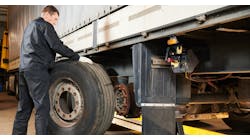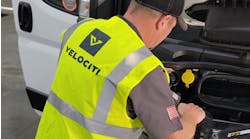With global supply chains experiencing a multitude of challenges from port congestion to product shortages, it is important for companies to plan for what is in their control as they manage risk. While much attention is rightly being focused on the impact of the pandemic on current conditions, Mother Nature is also a key element that frequently affects supply chain security. She can change directions at the snap of finger, and sometimes what she leaves in her wake is unpredictable.
Luckily, weather forecasters have gotten better at predicting patterns and storms over the years. But with snow and ice storms at their peak, it’s never a bad idea to plan ahead and prepare for the impact on your fleet.
We’ve already seen the dangers these storms can cause—like leaving motorists stranded on the roadways. To better address these challenges, here are five tips for fleets to better protect their people and equipment.
1. Plan ahead
Historical weather patterns can be viewed long in advance, and forecasters can predict exactly what will come up to a month in advance and get more accurate as a storm approaches. It’s good to know what type of storm is coming and have a plan in place to ensure you have the proper staff at facilities and the equipment ready to handle whatever conditions Mother Nature throws your way. This includes having ice scrapers, shovels, tire chains, plows, and salt ready to go.
2. Keep trucks clear of ice and snow
Ice buildups on trucks, whether it be on the windshields, the lights, on wires, or on the trailer, can weigh the truck down, limit visibility, and cause damage to the vehicle. Also, snow and ice accumulated around the fuel tank vents must be cleared to prevent the disruption of fuel flow to the engine. Ensure that the vehicle’s windshield defrosters are functioning properly to prevent ice build-up while driving. Before a truck is started, make sure to break off ice and snow from those areas. By installing snow scrapers at facilities, snow can more easily be cleared from the truck and trailer roof.
3. Protect your equipment from corrosion
Salt and other de-icing material used on the roadways can accelerate corrosion to your equipment, which will cost you in the long run. Protect against rust by waxing the outside of your vehicles to add an extra seal. Wash the vehicles frequently, utilizing a truck wash facility equipped with an undercarriage pressure wash to remove salt residue and avoid driving through puddles and deep snow where salt collects.
4. Clear facilities of ice and snow
Shovel and salt walkways and plow roads into and out of facilities to ensure optimal safety. Your team’s safety is the top priority, and if someone is injured due to snow or ice, it hampers your operations that much more.
5. Communicate and trust your employees’ feedback
If a storm is brewing and schedules need to be changed, make sure to communicate well in advance so that you can adjust and ensure you have proper staffing. Additionally, stay current with the latest conditions, knowing whether or not road conditions are safe and that the facility itself is a safe working environment. The risk is not always worth the reward. Your team’s safety is always the priority.
Information provided by: A. Duie Pyle



